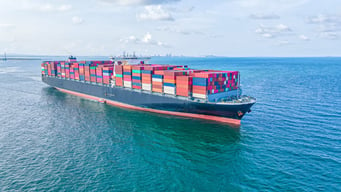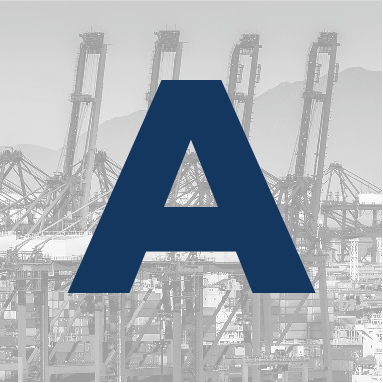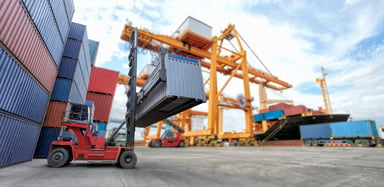
Automated Manifest System (AMS)

Home > Freight Glossary > Automated Manifest System (AMS)
What is the Automated Manifest System?
The Automated Manifest System (AMS) is a tracking system used by U.S. Customs and Border Protection (CBP) to manage the documentation and movement of goods entering the United States. AMS is a critical part of the customs process, ensuring that cargo information is electronically submitted to authorities before arriving at a U.S. port. This system helps streamline the flow of international shipments and ensures that customs officials have timely access to accurate shipment data.
How Does AMS Work?
Under the AMS system, shipping carriers and freight forwarders electronically transmit details about the cargo being transported to U.S. Customs. This data includes essential information such as:
- Bill of Lading Number: The unique identifier for the shipment.
- Details of Goods: Descriptions, quantities, and weights of the cargo.
- Shipper and Consignee Information: Contact details of the sender and recipient.
- Origin and Destination: Locations of where the cargo is being shipped from and where it will be delivered.
The data must be submitted before the shipment reaches a U.S. port to allow customs officials to review and process the information.
Why is Automated Manifest System so Important?
AMS plays a key role in enhancing the security and efficiency of international trade by providing customs officials with advanced information on incoming cargo. This system allows U.S. Customs to:
- Improve Risk Assessment: By receiving shipment data in advance, customs officials can perform risk assessments and identify potentially dangerous or illegal cargo before it arrives.
- Streamline Cargo Entry: AMS expedites the customs clearance process, helping to reduce delays and bottlenecks at U.S. ports.
- Improve Accuracy: Electronic submission of data reduces the risk of errors that can occur with manual entry.
When is AMS Required?
AMS is required for all shipments arriving in the U.S. by sea or air. Both ocean freight and air freight carriers must file their cargo manifests through AMS before arrival. Non-compliance with AMS requirements can lead to penalties, fines, and delayed shipments.
Responsibilities in the AMS Process
- Carriers: Shipping lines or airlines are responsible for submitting manifest data to U.S. Customs through the AMS system. They must ensure the accuracy and timeliness of the information.
- Freight Forwarders: Freight forwarders may also submit AMS data on behalf of shippers. They must coordinate with carriers to ensure all required information is provided.
AMS vs. Other Cargo Management Systems
While AMS is specific to the U.S., many other countries have similar cargo reporting systems. For example, Canada uses the Advanced Commercial Information (ACI) system, and the European Union has the Import Control System (ICS). AMS is tailored to U.S. customs regulations but operates similarly to these international systems in its goal to manage and secure inbound shipments.
Benefits of Using Automated Manifest System
- Faster Customs Clearance: AMS enables quicker processing of cargo, reducing delays and speeding up the release of goods.
- Enhanced Security: By screening cargo in advance, AMS helps identify potential threats and ensures greater security at U.S. borders.
- Accurate Tracking: AMS improves the tracking of shipments, allowing shippers and carriers to monitor the progress of goods as they enter the U.S.
- Regulatory Compliance: AMS ensures that carriers and freight forwarders comply with U.S. customs regulations, avoiding penalties and delays.
Potential Challenges with AMS
- Data Accuracy: Incorrect or incomplete data submissions can lead to delays, fines, or rejected entries.
- Technical Integration: Small businesses or new shippers may face difficulties integrating AMS with their existing logistics systems, but many third-party logistics providers offer solutions to assist with compliance.
Legal and Compliance Aspects
AMS is governed by U.S. Customs and Border Protection (CBP) regulations. Carriers and freight forwarders must comply with these regulations to avoid penalties. Compliance requires timely and accurate submission of all cargo data through the AMS portal before the shipment arrives at a U.S. port.
Practical Applications and Examples
- Shipping Companies: A shipping company transporting goods from Asia to the U.S. must file an AMS submission detailing the contents, origin, and destination of the cargo before the ship enters U.S. waters. This ensures that the goods are reviewed and cleared efficiently by customs upon arrival.
- Freight Forwarders: A freight forwarder consolidating shipments from multiple clients for export to the U.S. must provide all the necessary data through AMS to avoid delays at the destination port.
Contact

Ocean Freight

Road Freight

Connect with Our Logistics Experts
Choose the specialized line for your specific cargo needs. Our dedicated teams are standing by to assist you in real-time.








